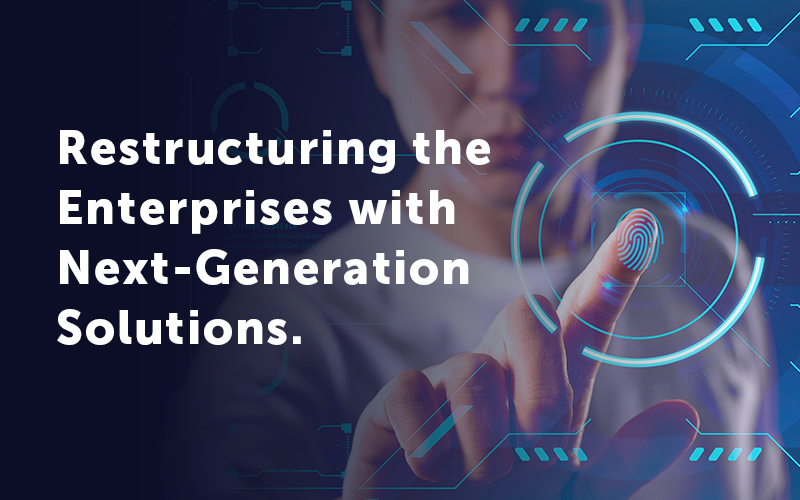The rate at which technology changes in the current era, is no doubt a challenging task for the businesses to keep up with it. Digital technologies have given rise to a new phenomenon called share reality. The next-gen technologies that revolve around AI, ML, Chatbots, AR/VR, and IoT solution services are all about increasing the usability, scalability, and resources in the future. Since automation is completely transforming the mundane human operations, businesses are in constant fear of losing their competitive edge too.
The next-gen infrastructure has compelled enterprises to move from silo-based business models to integrated solutions. Those who understand and tap into the potential of data generation and data intelligence analytics leverage their market position.
How Enterprises Can Reshape their Business Models with Next-Gen Solutions
Consumers have always been the driving force behind changing business requirements to ensure they keep delivering top-notch performance. With convenience and connectivity becoming two crucial customers’ expectations, innovation and disruption is the only way forward. Here’s how companies can invest in refreshing and innovative technologies to feed their reputation:
Automation in Production Processes
Combining Artificial Intelligence and automation can influence many industries to bring a significant shift in the relationship between capital and labour. Both technologies enable companies to draw less focus on labour costs. Hence, they can focus on more on crucial aspects like resource accessibility, workforce skills, consumer markets, and quality of infrastructure. Many enterprises have already equipped their staff with virtual agents that utilize machine learning development and Natural Language Processing (NLP) to manage each task. Whether it’s a manufacturing company or a service provider, each business is slowly moving its production process to proximity to consumer markets.
Logistics and Transaction Costs
Automated processes of international shipments, deliveries, and payments have significantly lowered the costs of coordinating with different teams. Digital platforms now connect sellers with buyers that help in creating sophisticated networks of global marketplaces. According to a study by AliResearch, international e-commerce sales are projected to reach almost $1 trillion by the year 2020. Since online marketplaces substitute offline flows, micro-multinationals are on the rise. IoT is another crucial enhancement in tracking shipments on a real-time basis along with AI tracking the truck routes according to the conditions of roads. Self-driving trucks, drones, automated cranes, and vehicles can load and unload containers faster, reducing the risks of human errors.
Workforce Mobility and Agility
Mobile technology is the most convenient source of carrying out business operations and serving customers. The speed and security of mobile connections is a crucial factor for adopting technology across various work environments. These aspects also ensure that the workforce of a company becomes more flexible, connected, and mobile. Internet of Things has only skyrocketed the potential of mobile innovation by keeping each device connected. Accessing the Internet from distinct sources and devices increase the possibilities for innovation and reduces potential security risks. Enterprises can utilize such technology for training their employees and workers in following data information security protocols as they prepare themselves to become agile.
Cloud Infrastructure Interoperability
Large corporations can sometimes face the challenge of investing in long-term solutions for managing and maintaining IT infrastructure. Since the technology keeps changing at such a rapid pace, it might land them in the treacherous waters of either developing an entirely new one or migrating it to a new platform. Each customized infrastructure doesn’t have enough capabilities to anticipate future demands of next-gen IT solutions. Hence, cloud environments and security systems need proper integration.
Big Data can be of massive help in securing the sensitive information that companies collect and store. It can be highly vulnerable to evolving security threats if a business needs to change the information or failure of security processes. Cloud policies can ensure that companies can upgrade their infrastructure along with keeping up with workforce mobility. It can also eliminate the need to upgrade major hardware systems by migrating a unified and comprehensive environment to cloud storage.
Concluding Thoughts
Integrating next-gen solutions is more about finding the right blend of technologies for your business processes. It demands skill and proper knowledge about automation to enhance the management and resources of an organization systematically. WeCode – www.wecode-inc.com is one such next0gen solutions providing company that helps businesses in introducing robotics and language processing solution for warehouses, production, and customer interactions. A perfect combination of functionalities and automation enable enterprises to raise their standards and market reputation continuously.


